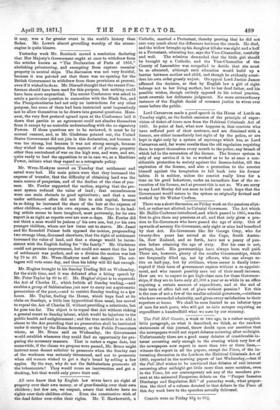There was a short discussion on Friday week on the
pensions allot- ted, or rather not allotted, to Colonial Governors. The Act which Mr. Baillie Cochrane introduced, and which passed in 1865, was the first to give them any pensions at all, and that only gives a pen- sion to Ex-Governors who have passed the age of sixty. Out of upwards of seventy Ex-Governors, only eight or nine had benefited by that Act. Ex-Governors like Sir George Grey, who for twenty-five years has served at the Cape, South Austra- lia, New Zealand, and so forth, have not a penny of pen-
sion before attaining the age of sixty. But his case is not, perhaps, hard. His governorships have always been well paid. There are, however, plenty of the smaller Governorships, which are frequently filled up, not by officers, who can always re- tire on half-pay, but by civilians, whose career is finally inter- rupted if their term of government expires without a re-appoint- ment, and who cannot possibly save out of their small incomes. How are we to expect to get high-class men for these Governor- ships, if they are to have only £1,000 a year or BO while in an office requiring a certain amount of expenditure, and at the end of their term of office fall out of place without pension ? Yet this is the case of not a few of the smaller colonial governors,—civilians who have succeeded admirably, and given every satisfaction to their superiors at home. We shall be soon limited to an inferior type of men for such posts, who will get us .into scrapes requiring an expenditure a hundredfold what we save by our economy.


































 Previous page
Previous page